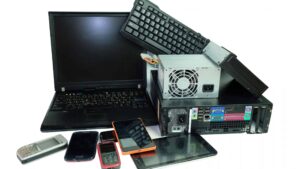You already wondered if you leave a device electronic Can saved for a long time end up damaging the equipment? This is a common doubt, especially when we talk about devices that we do not use frequentlylike old video games and cameras.
And the answer is yes: Over time, some problems may arise on the devices even if they are turned off. In this article, we will explain why this happens and how to avoid damage to storing your electronics for long periods.
What do you need to know
PIFAM electronics if they stand still for a long time?
Many people believe that storing an electronic for a long time is a safe way to preserve it. After all, if it is not being used, there is no wear, right? Not exactly. The reality is more complex.
Even turned off, electronics remain susceptible to factors such as humidity, dust, oxidation and natural deterioration of internal components. All of this can compromise the functioning of the device when it is rereaded.
Although there is no exact deadline for equipment to be failed due to lack of use, it is important to understand the risks involved and adopt basic care when storing these devices.
It is noteworthy that electronics do not “break” just because they are stopped. However, time unused can speed up natural wear and increase the chance of failures.
Check out the following main reasons which explain why electronic devices can have problems even when they are not in operation.
Oxidation and corrosion
Internal metal parts, such as connectors, plates trails and welding points, can oxidize over time. This process is intensified in humid environments, generating poor contact, intermittent failures and even permanent damage.
Condensation of moisture
Sudden temperature changes cause condensation within the device, forming water droplets that can cause short circuits as soon as the device is reconnected.
Accumulated dust
Dust can obstruct fans, clog air outs and deposit on sensitive components. This raises the risk of overheating and failures in operation.
Component degradation
Electrolytic capacitors, common in power supplies and motherboards, get older even unused. They can dry or leak, directly affecting equipment performance.
Lubrication loss
Mobile parts such as engines or compressors depend on internal lubrication. Over time, this lubrication can dry out, causing crashes and mechanical failures.
Battery Damage
Lithium batteries suffer degradation even unused. When stored discharged or with full load for long periods, they may lose capacity, swell or go into deep discharge, becoming unusable.
How to store electronics correctly
To reduce the risk of damage during extended storage, it is important to adopt some basic care:
- Avoid humidity: Wet environments favor corrosion. Prefer dry, fresh and well ventilated places;
- Protect against dust: Cover the devices with tissues or antiestatic plastics. Storing in closed boxes also helps to prevent particle accumulation;
- Keep the temperature stable: Avoid places with sudden thermal variations such as outdoor areas, attics or near windows;
- Cleaning and preparation: Store the clean, dry appliances and, in the case of appliances, without waste or water accumulated inside.
Read more:
Cell phone
- Problems: Battery discharged, oxidation in connectors, screen failures
- Care: Keep about 50% load and recharge every 2 months
Notebook
- Problems: slow boot, dry thermal paste, battery degradation
- Care: Call monthly and store in a dry place
Table pc
- Problems: dust in coolers, worn -out capacitors, source failure
- Care: prevent preventive cleaning and use stabilizer when reconnecting
Video game
- Problems: Locking, defective reader, outdated firmware
- Care: Call occasionally and keep the system up to date
Television
- Problems: Failure on the panel, input input inoperative, spots on the screen
- Care: cover properly and connect every 1 or 2 months to avoid internal moisture
Refrigerator
- Problems: dry sealing, mold, engine locked
- Care: Clean before turning off, keep the door ajar and reconnect occasionally
Washing machine
- Problems: leaks, dry hoses, inactive engine
- Care: Store the dry machine, with hoses positioned correctly, and turn on every few months
Microwave
- Problems: keyboard with malfunction, internal odors, rust
- Care: Clean completely before storing and keeping the door ajar











